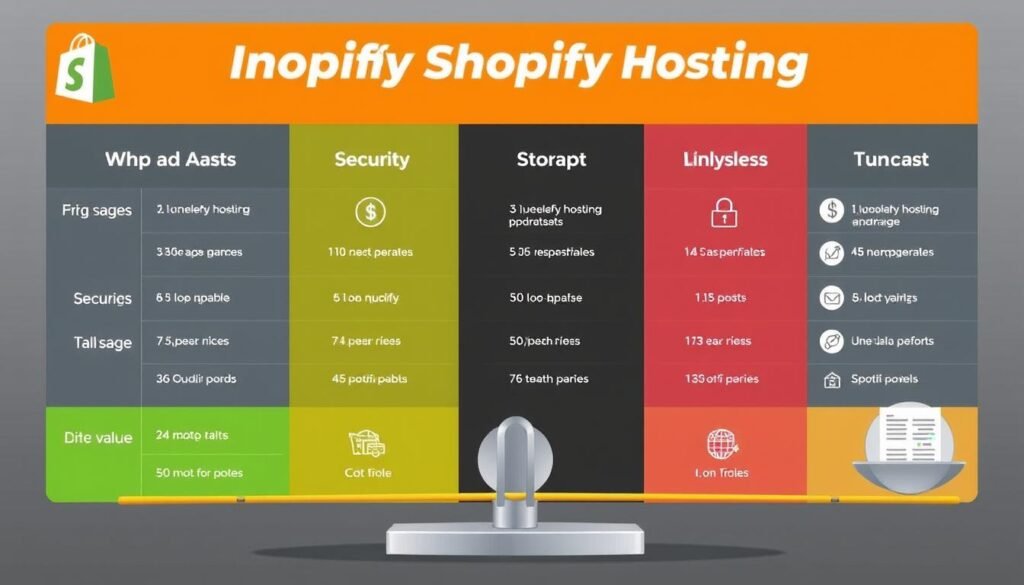Finding the right web hosting service is key for small business success in e-commerce. But what makes a hosting provider truly Shopify-compatible? As we approach 2025, the need for fast, secure, and scalable Shopify hosting is greater than ever. The question is, which providers will stand out as the best in the industry?
Key Takeaways
- Shopify offers a range of hosting plans, from $5 per month for a Starter package to $2,300 per month for complex enterprise-level stores.
- Leading web hosting providers for Shopify in 2025 include Shopify, A2 Hosting, DreamHost, IONOS, Bluehost, and GoDaddy, among others.
- Factors like uptime, security, scalability, and customer support are key when choosing a Shopify-compatible host.
- Emerging web hosting trends include green initiatives, multi-cloud solutions, and AI-powered performance optimization.
- Careful evaluation of hosting features, pricing, and integration capabilities is essential for Shopify store success.
Understanding Web Hosting for E-commerce Platforms
For e-commerce sites to thrive, they need web hosting that supports their online needs well. Shopify-compatible hosts should offer a strong infrastructure, quick loading times, and top-notch security. This ensures a great experience for customers. Knowing what technical needs Shopify stores have and how hosting impacts success is key for business owners aiming to grow online.
What Makes a Hosting Provider Shopify-Compatible
Shopify, a top e-commerce platform, started in 2006 and charges a subscription fee. It makes running an online store easy by handling updates and security. This lets business owners focus on their main tasks. Web hosts that work well with Shopify need to offer lots of bandwidth, storage, and easy integration with Shopify’s tools.
Key Technical Requirements for Shopify Stores
- Enough storage for lots of product pages, categories, and media files.
- Enough bandwidth to handle big traffic spikes without website problems.
- Strong security to keep customer data safe and the platform running smoothly.
- Works well with Shopify’s tools for a smooth user experience.
The Role of Web Hosting in E-commerce Success
Web hosting is vital for e-commerce success. Reliable hosting ensures your site is always up and loads quickly. Google says e-commerce sites should load in 2 seconds or less. Good hosting can help meet this goal. Also, the cost and ability to grow of your hosting plan can affect your store’s success.
Essential Features of Premium Shopify Hosting Services
Choosing the right high-performance Shopify hosting is key for your e-commerce store. Premium services offer features that boost your store’s performance, security, and scalability. These are the signs of a reliable and robust hosting solution.
One important feature is solid-state drive (SSD) storage. SSDs make data access fast, cutting down page load times. This gives your customers a smooth experience. Hosting services also use data caching and content delivery networks (CDNs) to improve your store’s performance and speed.
Security is a big deal in premium managed Shopify hosting services. They include SSL certificates, malware protection, and DDoS attack prevention. This keeps your online business safe from threats. Managed hosting also handles server maintenance and security updates, so you don’t have to worry about IT.
As your Shopify store grows, being able to scale seamlessly is key. Premium hosting services offer scalability features. You can easily add more resources like bandwidth and storage as your business grows. This means your store can handle more traffic or product additions without slowing down.
Lastly, premium Shopify hosting providers offer 24/7 customer support and easy-to-use control panels. This makes managing your hosting environment and solving technical issues easy. These features help you have a hassle-free experience, letting you focus on growing your Shopify business.
Investing in a premium scalable Shopify hosting solution unlocks your store’s full power. You get fast performance, strong security, and easy scalability to support your business growth.
Best Web Hosting for Shopify: Top Providers Compared
Looking for the best web hosting for your Shopify store? There are many top providers to check out. It’s important to look at performance, speed, pricing, and security to make sure your business does well.
Performance and Speed Metrics
Uptime and loading times are key for any e-commerce site. Bluehost is a top choice, with a 99.98% uptime guarantee and fast load times. On the other hand, Hostinger’s uptime is 99.9%, but it didn’t do as well in real tests.
Pricing Structures and Plans
Web hosting costs can differ a lot. Bluehost’s Shopify plans start at $6.99 a month for the first year. Hostinger’s business plan is $4.49 a month for the same time. But, Bluehost’s prices can go up to $15.99 a month after the first year.
Security Features and Certifications
Security is a must for e-commerce sites. Look for hosts with strong security, like SSL certificates and firewalls. Bluehost gives free daily backups for a year, and Hostinger offers free website migration for a smooth move.
When picking web hosting for your Shopify store, think about affordable shopify hosting, business website hosting, and web hosting plans. This will help you find the best fit for your needs and budget.
“A 1-second delay in loading an eCommerce website can lower conversions by 7%.”
Security and Performance Optimization
Keeping your website safe and fast is key for any business, but it’s even more important for e-commerce sites. A secure and fast website protects your customers’ data and makes their experience better. This leads to more engagement and sales.
For website security, using SSL certificates is a must. SSL encryption keeps data safe as it moves between your site and users. Regular checks and scans for malware help keep your site safe from threats.
To make your website faster, consider using content delivery networks (CDNs). They make sure your site’s files, like images, load quickly no matter where users are. Caching and server tweaks can also make your site load faster, giving users a better experience.
It’s also vital to have backups and a disaster recovery plan. These help you get back online fast if something goes wrong. This way, you can keep your business running smoothly.
Optimizing your website, like compressing images and minifying code, can also boost performance. Smaller files mean faster page loads. This makes your site better for users and helps your website performance and SEO for businesses.

Focus on making your e-commerce site secure and fast. This creates a safe and easy shopping experience. It also helps protect your customers’ data and boosts your website security and sales.
Scalability and Growth Potencial
To grow your online business, scalable Shopify hosting is key. The best web hosting for Shopify has strong traffic management, flexible resources, and clear upgrade paths. These help your business grow smoothly.
Traffic Management Capabilities
Choose hosting with load balancing and auto-scaling. These features help your Shopify store handle sudden traffic spikes. This includes flash sales and seasonal peaks, keeping your site fast and accessible.
Resource Allocation Features
As your online presence grows, adding more storage, RAM, and power is vital. Top Shopify hosting providers offer flexible resource allocation. This lets you scale your server as your business needs change.
Upgrade Pathways
When you outgrow your hosting plan, easy upgrades to VPS or dedicated servers are key for growing your business. The best Shopify hosting providers make these upgrades simple. This ensures your store’s performance and reliability during rapid growth.
By focusing on scalable Shopify hosting, you prepare your online business for the future. Your website stays agile, responsive, and ready for more traffic and data as your company expands.
Cost Analysis and ROI Considerations
Choosing the right web hosting for your Shopify store is key. You need to look at the costs and the return on investment (ROI). The initial price might look good, but think about the long-term costs and hidden fees. Also, consider how hosting quality affects your business’s growth.
Shopify has many hosting plans, each with different prices and features. Prices range from $5 a month for the Shopify Starter plan to $2,000 a month for Shopify Plus. It’s important to compare each plan’s features to find the best value for your money.
There are also extra fees to consider, like payment processing charges and transaction fees. Shopify’s fees vary, from 2.9% + $0.30 for the Basic plan to 2.5% + $0.30 for the Advanced plan. Using Shopify Payments can help avoid these fees.
The quality of your hosting is also vital for your ROI. Good hosting means faster sites and better customer experiences. This can lead to more sales and loyal customers. Investing in premium hosting could pay off in the long run.
To get the best deal, compare the features and costs of different Shopify hosting plans. Think about your business’s needs, growth, and how hosting affects your profits. With a careful cost analysis and focus on ROI, you can choose the most affordable and effective hosting for your Shopify store.

“Investing in the right Shopify hosting can be a game-changer for your e-commerce business, driving increased sales and profitability in the long run.”
Technical Support and Customer Service Quality
Good customer support is key when picking a web host for your Shopify store. Top hosts offer 24/7 help, usually within an hour. They have many ways to contact you, like live chat, phone, and email.
Support levels vary a lot. Look for hosts with teams trained for e-commerce. They can help with tough tech issues and improve your store’s performance.
Response Time Standards
Fast hosts for Shopify aim to answer quickly, often in under an hour. This keeps your store running smoothly and happy customers.
Support Channels Available
- Live chat: Enables real-time assistance and quick resolution of problems.
- Telephone support: Provides personal interactions with knowledgeable representatives.
- Email ticketing system: Allows for detailed documentation and follow-up on complex issues.
Expert Assistance Levels
The best Shopify hosts have teams with lots of e-commerce experience. They offer detailed help on improving your store, adding new features, and solving hard tech problems.
| Web Hosting Provider | Response Time Standards | Support Channels | Expert Assistance Levels |
|---|---|---|---|
| Bluehost | 24/7 support, 30-minute response time | Live chat, phone, email | Dedicated Shopify experts, advanced technical support |
| HostGator | 24/7 support, 1-hour response time | Live chat, phone, email | Specialized e-commerce support team |
| SiteGround | 24/7 support, 15-minute response time | Live chat, phone, email | Experts in Shopify website optimization and management |
Focus on good technical support and customer service for a thriving Shopify store. It boosts your customer’s experience and helps you manage your site better.
Integration Capabilities with E-commerce Tools
Running a successful e-commerce site needs smooth integration with many tools. The best web hosting for Shopify should work well with popular e-commerce solutions and payment gateways. This makes shopping online easy and efficient for customers.
Shopify is a top e-commerce platform known for its strong integration. It has thousands of apps and plug-ins in the Shopify App Store. This lets businesses customize their stores in many ways, from accounting software to CRM systems.
Cyclr is an example of how Shopify users can connect their stores with over 350 apps easily. This makes sharing data and automating tasks simpler, boosting efficiency and productivity.
Shopify also makes marketing easier by integrating with Google, Facebook, and social media. This helps businesses reach more customers and grow sales. It also opens up chances for cross-selling and upselling.
Shopify’s website builder, themes, and SEO tools help businesses create attractive and search-friendly sites. These tools let entrepreneurs focus on their business while ensuring a strong online presence and customer experience.
In summary, the best web hosting for Shopify must offer strong integration capabilities. This helps e-commerce sites work better with many tools and platforms. Shopify-compatible hosting providers help businesses run smoothly, engage customers better, and grow online.
Website Migration and Setup Process
Switching your website to a new host can seem tough. But, the right host makes it easy. Look for hosts that help with migration. This way, you can easily move your site and start selling online.
The setup should be easy, with good help and clear guides. Many hosts have simple website builders and templates. These tools are great for beginners or those who want to quickly set up their website design.
Choosing a host that also registers domains is a smart move. It makes starting your online presence easy. You can get online quickly with this all-in-one service.
“Slinger, a popular tennis brand, experienced a remarkable 40% revenue growth after migrating their online store to Shopify’s platform.”
Moving to Shopify can take different paths, like a headless setup. This might need extra steps like designing your architecture and testing it. Make sure everything works smoothly before you go live.
| Hosting Service Feature | Percentage of Providers Offer |
|---|---|
| Infrastructure services (servers, storage) | 82% |
| Shared hosting | 68% |
| VPS hosting | 53% |
| Dedicated hosting | 42% |
| Cloud hosting | 61% |
| Managed hosting services | 75% |
By picking a host with a smooth migration and easy setup, you can quickly start your Shopify store. This lets you focus on growing your business without stress.
Conclusion
There are many web hosting options for Shopify, each with its own benefits. Shopify’s hosting is popular, but Hostinger Web Hosting offers great alternatives for e-commerce sites.
Hostinger Web Hosting is known for being affordable and reliable. It has managed hosting, easy server management, and 24/7 support. It offers a variety of plans for different business sizes and budgets.
Finding the right web hosting for your Shopify store depends on your business needs and budget. Look at performance, security, scalability, and support to make a good choice. This will help your e-commerce business succeed in the long run.
